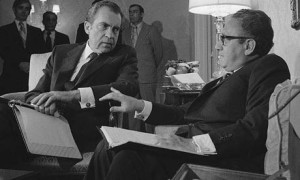Q. Kissinger is frequently called a “realist,” but you disagree. How so?
There are lots of ways to define political “realism,” but at its heart is the idea that “reality” is objective and observable – that one’s interests and power are knowable. Kissinger is often associated with this worldview but the truth is, he believed in none of it. He didn’t (and still doesn’t, since his philosophy has been fairly consistent from his 1950 Harvard undergraduate thesis to his most recent book, World Order) believe human beings have access to “reality.” As he put it in 1950, “every man in a certain sense creates his picture of the world.”
Q. Why is this important?
Because this philosophy drove his policy making: because Kissinger didn’t believe that reality existed, or, rather, that policy makers had access to reality; he didn’t believe that objective interests or material power existed. He constantly insisted that nations and their leaders could only come to define their interests and power through will and action.

Q. Kissinger is often celebrated as a “grand strategist.” But you say there is a circularity at the core of his diplomacy. Can you explain?
Kissinger started his career as a defense intellectual criticizing the senseless projection of power for power’s sake. We have to know our purpose, he said, where we want to be in ten years’ time and what kind of a society we want to have. But he never, in his seven decades writing about diplomacy, defined what he means by purpose. If the projection of power is the means, what is the end, the purpose? This leads to the circularity that is at the heart of his “grand strategy”: Power should only be deployed by statesmen who know their purpose, what they want to accomplish, but statesmen can only know their purpose by projecting, or testing, power. By the mid-1950s, Kissinger had built his own perpetual motion machine: the purpose of American power was to create an awareness of American purpose. And since Kissinger held to an extremely plastic notion of reality, other concepts he was associated with, such as “interests,” were also pulled into the whirlpool of his reasoning: we can’t defend our interests until we know what our interests are and we can’t know what our interests are until we defend them.
Q. Why is it important to understand Kissinger’s theories and actions today? How have they affected modern administrations’ foreign policy?
Using Kissinger’s long life and thoughts, I’ve tried to draw a line from Vietnam and Cambodia to today’s endless, global war. In terms of tactics and in terms of political rationales, Kissinger bequeathed his successors a powerful set of tools to wage and justify endless war.
Q. The most famous critical book on Kissinger is Christopher Hitchens’s bestselling, The Trial of Henry Kissinger. How is your book different from his?
When I mentioned to friends and colleagues that I was writing a book about the legacy of Henry Kissinger’s foreign policy, many made mention of Christopher Hitchens’ book, which was published in 2001. The Trial of Henry Kissinger is a good example of what the great historian Charles Beard, in 1936, dismissed as a “devil theory of war,” which blames militarism on a single, isolatable cause: a “wicked man.” In making the case that Kissinger should be tried – and convicted – for war crimes, Hitchens didn’t look at the big picture. Besides the obvious, which is that Kissinger is a criminal, Hitchens doesn’t provide much understanding or tell us what it all means. The book provides no insights into the “total situation” in which Kissinger operated, makes no effort to explain the power of his ideas, or how those ideas tapped into deeper intellectual currents within American history and influenced later generations of militarists. Hitchens leaves us with a depiction of Kissinger as a ravager of American values, out of place in his adopted democratic land, which misses the point.
Author Greg Grandin talks to Democracy Now! in 2015
Greg Grandin is the author of Kissinger’s Shadow: The Long Reach of America’s Most Controversial Statesman and The Empire of Necessity; Fordlandia, which was a finalist for the Pulitzer Prize and the National Book Award; as well as Empire’s Workshop and The Blood of Guatemala. A professor of history at New York University and a recipient of fellowships from the Guggenheim Foundation and the New York Public Library, Grandin has served on the UN Truth Commission investigating the Guatemalan Civil War and has written for the Los Angeles Times, The Nation, & The New York Times.
